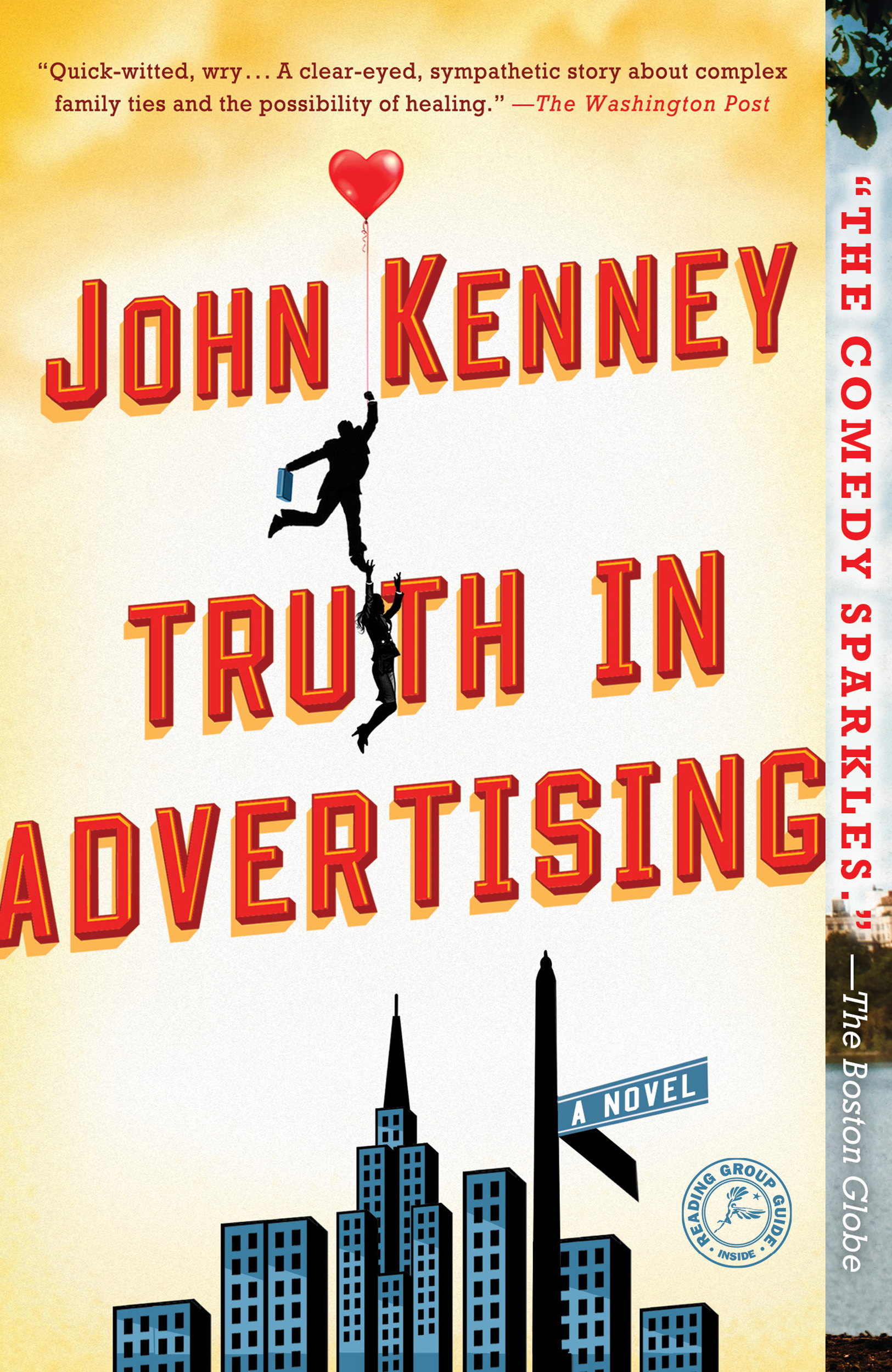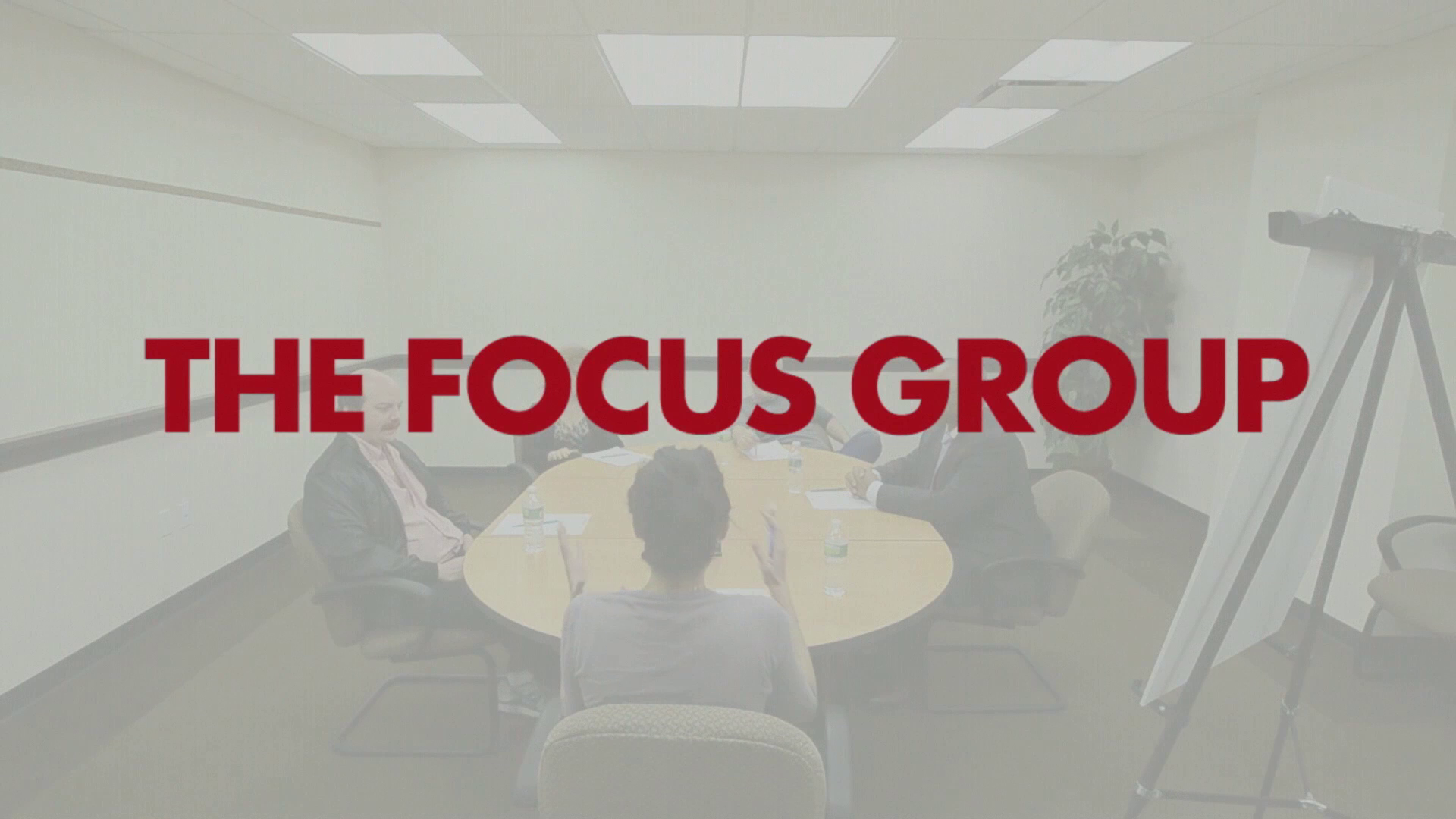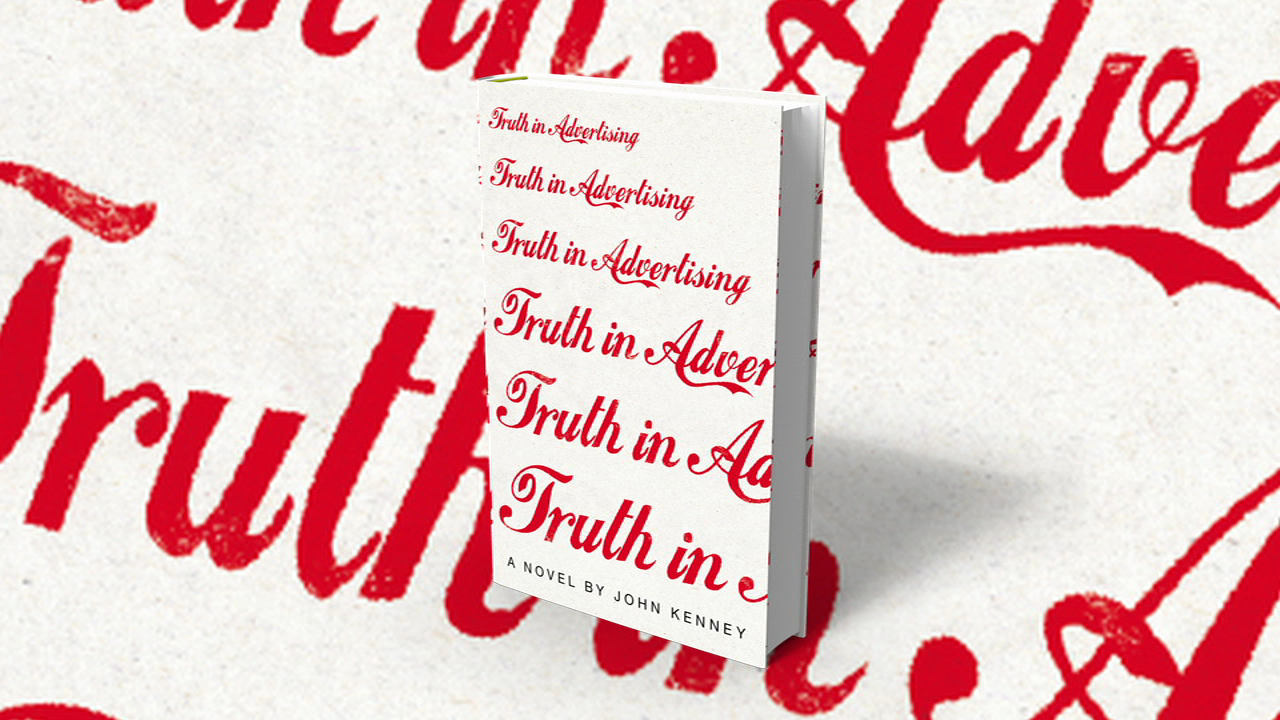Plus, receive recommendations and exclusive offers on all of your favorite books and authors from Simon & Schuster.
LIST PRICE $16.99
Free shipping when you spend $40. Terms apply.
Buy from Other Retailers
Table of Contents
About The Book
Finbar Dolan is lost and lonely. Except he doesn’t know it. Despite escaping his blue-collar Boston upbringing to carve out a mildly successful career at a Madison Avenue ad agency, he’s a bit of a mess and closing in on forty. He’s recently called off his wedding. Now, a few days before Christmas, he’s forced to cancel a long-postponed vacation in order to write, produce, and edit a Superbowl commercial for his diaper account in record time.
Fortunately, it gets worse. He learns that his long-estranged and once-abusive father has fallen ill. And that neither his brothers nor his sister intend to visit. It’s a wake-up call for Fin to re-evaluate the choices he’s made, admit that he’s falling for his coworker Phoebe, question the importance of diapers in his life, and finally tell the truth about his life and his past.
In the spirit of Then We Came to the End and This Is Where I Leave You, novelist John Kenney, a regular New Yorker contributor, mines his own advertising background to creating this moving debut, nothing short of “a masterful blend of wit and seriousness, stunning in its honesty” (Booklist, starred review).
Reading Group Guide
Get a FREE ebook by joining our mailing list today! Plus, receive recommendations for your next Book Club read.
Introduction
Despite escaping his blue-collar Boston upbringing to carve out a mildly successful career at a Madison Avenue ad agency, Finbar Dolan is a bit of a mess and closing in on forty. He’s recently called off a wedding. Now, a few days before Christmas, he’s forced to cancel a long-postponed vacation in order to write, produce, and edit in record time a Superbowl commercial for his diaper account. When he learns that his long-estranged and once-abusive father has fallen ill, and that neither of his brothers or his sister intends to visit, Fin is forced to reevaluate the choices he’s made, admit that he’s falling for his coworker Phoebe, question the importance of diapers in his life, and finally tell the truth about his past. Truth in Advertising is first-time novelist John Kenney’s wickedly funny, honest, at times sardonic, and ultimately moving story about the absurdity of corporate life, the complications of love, and the meaning of family.
Topics & Questions for Discussion
1) Truth in Advertising pokes fun at the advertising industry, yet often makes a case for it being an underappreciated art form. Do you think there is artistic value in advertising? Can you think of an example of an ad campaign or commercial that might be considered aesthetically important?
2) Fin’s relationship with his father was volatile and complicated. Is it always necessary, or possible, to forgive those who have done us so much damage in the past? Is there ever an excuse for cutting ties with a parent?
3) At different points throughout the novel, Fin has imaginary interviews with Terry Gross, Barbara Walters, and Oprah. What function does this device serve? Do you think it’s effective?
4) Why do you think the author waits so long to reveal that Fin was present when his mother died? What does this revelation teach the reader about Fin? Do you think he was right to keep this secret to himself for so many years?
5) In today’s media-saturated culture, individuals are often encouraged to “brand” themselves using Facebook, Twitter, and other social media networks. How would you define the difference between a person’s “brand” and their personality? What is Fin’s brand?
6) Of all the Dolan children, why do you think Fin is the only one who agrees to scatter their father’s ashes? Is this act merely symbolic? Or do you really think it helps him resolve some of his anger toward his father?
7) Fin notes that both Phoebe and Pam are friends who “understand what you mean, not what you say” (p. 232) Why is this important to Fin?
8) Oftentimes tragedies bring families closer together. In the Dolans’ case, their father’s death initially just serves as a reminder of their troubled childhood and how far apart they’ve grown. What makes them incapable of finding solace in each other, and how do you think this has changed by the end of the novel?
9) Fin frequently complains about being dissatisfied with his job, yet he remains unable to leave. What aspects of the advertising industry does he find so compelling even as he struggles to justify staying in it? He talks about advertising being based on mythology and lies. What are some societal myths about happiness and success that Fin buys into and why do you think these are ultimately unable to satisfy him?
10) Phoebe and Fin play a game where they point out one beautiful thing they see each day. How does Fin’s relationship with Phoebe and the game they play affect the way he deals with his own anger and pain? Do you think there is beauty even in tragedy?
A Conversation with author John Kenney and comedian Andy Borowitz
Andy: You spent many years working in advertising. What made you decide to set your first novel in that world? Is the real world of advertising both as funny—and sad—as your fictional version?
John: It’s a cliché but they say write about what you know. So for me it was write about advertising or the inside world of being a busboy. Advertising, certainly in the post-Mad Men era, seems to have an allure. People find it exciting and fast-paced. It certainly can be. But day to day it’s far more boring, certainly for creative people, whose days are spent sitting in an office trying to think of ideas, most of which aren’t that great (in my experience, anyway). I don’t think it’s a sad business at all but it can test one’s resolve. There are times when it’s easy to step outside of the project at hand and say, “Do we really need to be this serious about the new sodium-free ketchup spot?” That said, I liked it better than being a busboy.
Andy: What’s the biggest misconception about advertising, and why does that interest you as a novelist?
John: I think it’s how cool/sexy/exciting advertising is supposed to be. It certainly can be if you’re working on a big account like Nike or Apple or Coke. But most creatives—the copywriters and art directors who think up the ideas—work on far smaller accounts, with far smaller budgets. These people are just as committed and just as smart, and, frankly, doing a really great ad for Oreos is damned hard. Or diapers, as is the case for Fin, the main character in the book. He’s not a superstar. But successful characters don’t really interest me I like strugglers. I like confused people, damaged people. Strivers. Of course, that has nothing to do with my own experience as a decidedly non-superstar copywriter…
Andy: That brings me to the question most novelists hate to be asked: Who is the narrator Fin, and are there parts of you in his character?
John: Fin is like a lot of guys I knew in advertising. Smart, charming, funny. Guys you wanted to hang around with, have a beer with. He’s a lot smarter than I am and certainly more lost than I ever was, though God knows I had my confused days as a single guy in New York. To me the similarity—if there is one—isn’t merely the advertising connection, it’s the loss. My mother died when I was young. That was a defining event for me. And it’s only much later in my life that I realized how defining, how it colored everything for me. Fin shares that. But I think a lot of us carry around hidden traumas, those lasting pains. My editor sent me a quote from a letter that Ted Hughes wrote to his son. At every moment, behind the most efficient seeming adult exterior, the whole world of the person’s childhood is being carefully held like a glass of water bulging above the brim. That’s Fin.
Andy: In the book, you write that we are the stories we tell ourselves. What is it that pushes Fin to finally tell himself the truth?
John: I think ultimately it’s his father’s death. Fin holds onto this anger and pain for so long, and I think it surprises him how sad his father’s death makes him, what a terrible waste it all was. It’s so hard to see your parents as people. We expect so much from them. I think he’s finally able to see his father for a flawed and traumatized man, to forgive him, to grieve for the life they never had together. He sees where not dealing with trauma and pain leads. And he doesn’t want that. I think he sees his own mortality. And it terrifies him. It makes him want to live.
Andy: Why do we meet Fin at this particular moment in his life?
John: Because he’s a mess. A job he doesn’t love. A recently canceled wedding. His estranged family and dying father. His cluelessness over Phoebe, his love interest. I think there comes a point where you realize the future isn’t limitless. For Fin it’s waking up on the eve of his fortieth birthday, being surprised by this, by the path life has taken. I think he sees that there’s a window that’s fast closing and that unless he acts differently, he’s going to be lost. He’s tried lying because the pain of the truth–of what he saw and experienced, of caring for someone who might leave–is simply too much for him. I think he finally sees that life is about courage. And the courage is to be honest with himself.
Product Details
- Publisher: Touchstone (October 1, 2013)
- Length: 336 pages
- ISBN13: 9781451675559
Browse Related Books
Raves and Reviews
A Book Riot Funniest Novel of the Year
“The protagonist, Finbar Dolan, is Don Draper stripped of all his glamour, success and pomade. What Fin, a midlevel copywriter, does have on Don is a sense of humor. . . . Framed around a surprisingly sweet romance, as well as Fin’s eventual confrontation with his painful family history, this debut offers a pleasing lightness-to-heart ratio.”
– New York Times
“Peppered with colorful impressions of New York City life, Truth in Advertising is a quick-witted, wry sendup of the advertising industry and corporate culture. . . . Delivers a clear-eyed, sympathetic story about complex family ties and the possibility of healing.”
– Washington Post
“[Kenney’s] insights are dead-on. . . . [His] plot is perfectly balanced between the insanity of both work and family, and the ending is satisfying without being saccharine. . . . Engaging and entertaining . . . The joy is in the journey, of spending time with a character that is, at times, annoying and thoughtful,arrogant and scared, childish and mature — in other words, someone like the rest of us.”
– Dallas Morning News
“You'd expect that a man who writes humor pieces for the New Yorker would be funny – and he is. John Kenney, who also worked as an advertising copywriter, knows that world and skewers it mercilessly and hilariously in his debut novel. . . . It would also be safe to say that amazing things will most likely be happening in John Kenney's literary career right now. Truthfully.”
– Cleveland Plain Dealer
“Truth in Advertising has a cinematic sense of motion. . . . [Kenney is] a naturally comic author who has created a likeable narrator in Fin Dolan. . . . Humor springs from a deep well of family-induced anguish, and soon enough comedy and tragedy are braided throughout the narrative.”
– Chicago Tribune
“This debut novel reads at times like a laugh-out-loud standup routine. What sustains it, though, is much more substantial: an engaging, believable plot, a fascinating if jaundiced view inside the contemporary world of New York advertising, and most of all, a lead character you're glad you get to know. . . . It's a measure of Kenney's writing talent that the regular gusts of delicious, smart-alecky ad agency banter among Dolan and his witty comrades and the painful-to-read scenes depicting the toxic relations among siblings feel equally real in this novel. . . . [A] smart, cinematic story.”
– Associated Press
"We're sold on Kenney's trenchant, quick-witted debut."
– Entertainment Weekly
"Kenney, who’s worked as a copywriter for 17 years, mines this rich territory for satire. . . . Fin’s struggle to understand his dad brings a layer of emotional complexity to the tale. . . . Kenney’s novel wrestles with deep questions: What makes a good man? What makes a good life? What should one’s contribution to the world be?"
– BusinessWeek
“In this Nick Hornby-esque fiction debut, midlife crisis and family tragedy force a 39-year-old ad man to reevaluate his priorities.”
– O Magazine (“Ten Titles to Pick Up Now”)
“A lively debut that has ‘movie deal’ written all over it.”
– People Magazine
"Here's a smart one. . . . Lovers of the city will find much to love in this relatable, redemptive, and sometimes very funny story."
– Denver Post
“The comedy sparkles [with] mordant one-liners, snappy banter, and hilarious workplace scenarios.”
– Boston Globe
"An honest and insightful novel about a business and a life that have both been anything but . . . . Wonderfully entertaining and elegantly written."
– Shelf Awareness (Best Books of 2013)
“It's the stuff of Jonathan Tropper novels and Judd Apatow films and every Zooey Deschanel fantasy.”
– USAToday.com
“The rare novel that's truly cinematic. It is sexy, the plot twists in just the right places; simply put, it's untamable. You will laugh almost as much as you will relate to the plight of the protagonist.. . . This book might just rouse the creative genius in you, too.”
– Interview.com
"Hilarious. . . . Kenney mixes inside advertising jokes with the broad comedy necessary to keep those in the real world laughing."
– AdAge.com
“[A] comedic send-up of the ad industry's self-importance, as narrated by a good-hearted if skeptical underachiever . . . A pleasure to read.”
– Christian Science Monitor
"New York-based Kenney . . . knows of what he speaks. He is particularly brilliant at clashing Fin’s jadedness with the unglamorous products he’s forced to pitch. . . . [A] delightfully caustic piece of satire."
– Toronto Star
"What really amazed me was the unexpected depth and subtleness of the rest of the book, which showcases writing that, in terms of talent, puts Kenney in a league with the best of American writers of his generation."
– Lurzer's International Archive (UK)
"It will make you laugh out loud at times and it will also touch you deeply. . . . This is the sort of book where you really care about the characters. . . . You will not be disappointed in Truth in Advertising. The plot is highly entertaining, but it is the joy of getting to know such a realistic, likeable, believable character as Finbar Dolan that makes this novel such a treat. Fin is the sort of guy you will enjoy spending time with.”
– Seattle Post-Intelligencer
"A snortingly funny debut ... Although Nick Hornby is the obvious reference — humor and heartbreak of ordinary life — this wonderful book is more J. Alfred Prufrock."
– The Phoenix (Boston)
"With wry humor, always on point, Kenney guides us through the maze of work, family, love (elusive) and friendship (a lifesaver). This is an outstanding debut."
– Kirkus Reviews (starred review)
"A masterful blend of wit and seriousness, stunning in its honesty. A novel sure to appeal to fans of Nick Hornby."
– Booklist (starred review)
"With wry wit, excellent pacing, and pitch-perfect, often hilarious, dialogue, Kenney has created something remarkable: a surprisingly funny novel about an adult American male finally becoming a man. Highly recommended."
– Library Journal (starred review)
Resources and Downloads
High Resolution Images
- Book Cover Image (jpg): Truth in Advertising Trade Paperback 9781451675559(1.1 MB)
- Author Photo (jpg): John Kenney Photo credit Rick Knief(0.1 MB)
Any use of an author photo must include its respective photo credit

















